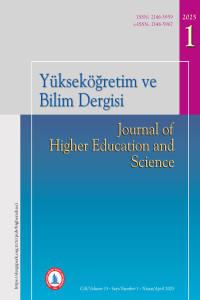Sağlık Bilimleri Fakültesinde Öğrenim Gören Öğrencilerin Öğretimin Kalitesi ve Akreditasyon Algıları: Tanımlayıcı ve İlişki Arayıcı Çalışma
Abstract
Ulusal ve uluslararası alanda nitelikli eğitim, rekabet gibi paradigmalar bir üniversitenin eğitim-öğretim kalitesinin ve bir akredite programın değerini ve önemini artırmaktadır. Bu bağlamda, bu programlardan yararlanan öğrencilerin, verilen eğitimin niteliğini ölçmek için öğretimin kalitesi ve akreditasyon algılarına ilişkin görüşlerinin alınması değerlidir. Bu araştırma, bir sağlık bilimleri fakültesinde öğrenim gören öğrencilerin öğretim kalitesi ve akreditasyon algı düzeylerini belirlemek ve iki algı arasındaki ilişkiyi araştırmak amacıyla yapılan tanımlayıcı ve ilişki arayıcı tipte bir çalışmadır. Araştırmanın örneklemini, 2023-2024 eğitim öğretim güz döneminde bir sağlık bilimleri fakültesinde öğrenim gören ve araştırmaya katılmaya gönüllü olan 860 öğrenci oluşturmuştur. Araştırmanın verileri Tanıtıcı Bilgi Formu, Üniversite Öğretim Kalitesi Algısı Ölçeği ve Akreditasyon Algısı Ölçeği kullanılarak toplanmıştır. Verilerin analizinde IBM 25.0 paket programı kullanılmıştır. Anlamlılık düzeyi 0.05'ten küçük p değerleri olarak kabul edilmiştir. Araştırmaya katılan öğrencilerin yaş ortalaması 20.43±2.21’dir. Öğrencilerin %84.5'i kadın, %34.3'ü birinci sınıf, %76.5'i Anadolu Lisesinden mezunu olup, %42.3'ü Hemşirelik bölümünde öğrenim görmektedir. Öğrencilerin öğretim kalitesi ve akreditasyon algısı düzeylerine ilişkin bulguları incelendiğinde; en düşük puan ortalaması Üniversite Öğretim Kalitesi Algısı Ölçeği’nin Öğretim Koşulları alt boyutunda (3.36±.69) iken, en yüksek puan ortalaması Üniversite Öğretim Kalitesi Algısı Ölçeği’nin Öğretim Elemanları alt boyutunda (3.65±.66) bulunmuştur. Üniversite Öğretim Kalitesi Algısı Ölçeği dört alt boyutunun puan ortalamaları ile Akreditasyon Algısı Ölçeği’nin her iki alt boyutunun puan ortalamaları arasında pozitif yönde zayıf güçte anlamlı bir ilişki olduğu bulunmuştur (p<0.05). Ayrıca, hemşirelik bölümü öğrencilerinin diğer bölümlerdeki öğrencilere göre akreditasyon algı düzeyleri daha yüksek bulunmuştur. Bu çalışmanın sonucunda kurumsal ya da program akreditasyonuna sahip olmayan ve/veya akredite olma hazırlığı yapan yükseköğretim kurumları için önemli bulgular ortaya konmuştur.
Ethical Statement
Araştırmada kullanılacak ölçeklere ilişkin izinler ölçek sahiplerinden alınmıştır. Araştırmanın yürütülebilmesi için Çankırı Karatekin Üniversitesi Sağlık Bilimleri Etik Kurulu’ndan etik izin (16.10.2023 tarihli Toplantı No:9) ve Sağlık Bilimleri Fakültesi’nden kurum izni (E-52950036-044-152619 sayılı yazı) alınmıştır. Araştırma kapsamına giren öğrencilere, çalışmanın amacı araştırmacılar tarafından açıklanmış ve katılımları için izinleri alınmıştır.
Supporting Institution
TÜBİTAK
Project Number
1919B012305952
References
- Alpaydın, Y., & Topal, M. (2022). Eğitim Fakültelerindeki Akreditasyon Deneyimleri Üzerine Nitel Bir Araştırma. İnsan & Toplum, 12(2), 232–265. https://doi.org/10.12658/M0657
- Bahar, Z. (2004). Verilerin çözümlenmesinde istatistiksel yöntemler. In İ. Erefe (Ed.), Hemşirelikte Araştırma İlke Süreç ve Yöntemleri (3.edition, pp. 189–250). Ankara: Odak Ofset.
- Baysal, A. (2015). Beslenme ve Diyetetik Eğitimi: Sorunlar-Çözüm Önerileri. Beslenme ve Diyet Dergisi, 43(3), 189–190. Çakır Koçak, Y., Öztürk Can, H., Yücel, U., Demirelöz Akyüz, M., &
- Çeber Turfan, E. (2017). Türkiye’de Ebelik Bölümlerinin Akademik ve Fiziki Profili. Sağlık Bilimleri ve Meslekleri Dergisi, 4(2), 88–97. https://doi.org/10.17681/hsp-dergisi.293047
Teaching Quality and Accreditation Perceptions of Students Studying at the Faculty of Health Sciences: A Descriptive and Correlational Study
Abstract
Paradigms such as qualified education in the national and international arena, competition increase the value and importance of a university's education and teaching quality and an accredited program. In this context, it is valuable to obtain the views of students benefiting from these programs on their perceptions of the quality of teaching and accreditation in order to measure the quality of education provided. This research is a descriptive and correlational study conducted to determine the perception levels of teaching quality and accreditation of students studying in a health sciences faculty and to investigate the relationship between the two perceptions. The research sample consisted of 860 students studying at a health sciences faculty in the 2023-2024 academic autumn semester who volunteered to participate in the research. The data of the study were collected using the Introductory Information Form, the University Teaching Quality Perception Scale and the Accreditation Perception Scale. The IBM 25.0 package programme was used for data analysis. The level of significance was accepted as a p-value of less than 0.05. The mean age of the students participating in the study was 20.43±2.21 years. 84.5% of the students were female, 34.3% were first-year students, 76.5% were Anatolian High School graduates and 42.3% were studying nursing. When the findings regarding the students' teaching quality and accreditation perception levels were examined, the lowest mean score was found in the teaching conditions sub-dimension of the the University Teaching Quality Perception Scale (3.36±.69), while the highest mean score was found in the teaching staff sub-dimension of the the University Teaching Quality Perception Scale (3.65±.66). It was found that there was a weakly positive, significant relationship between the mean scores of the four subscales of the the University Teaching Quality Perception Scale and the mean scores of both subscales of the Accreditation Perception Scale scale (p<0.05). In addition, it was found that nursing students' perception of accreditation was higher than that of students in other departments. As a result of this study, important findings revealed for higher education institutions that do not have institutional or program accreditation and/or are preparing for accreditation.
Project Number
1919B012305952
References
- Alpaydın, Y., & Topal, M. (2022). Eğitim Fakültelerindeki Akreditasyon Deneyimleri Üzerine Nitel Bir Araştırma. İnsan & Toplum, 12(2), 232–265. https://doi.org/10.12658/M0657
- Bahar, Z. (2004). Verilerin çözümlenmesinde istatistiksel yöntemler. In İ. Erefe (Ed.), Hemşirelikte Araştırma İlke Süreç ve Yöntemleri (3.edition, pp. 189–250). Ankara: Odak Ofset.
- Baysal, A. (2015). Beslenme ve Diyetetik Eğitimi: Sorunlar-Çözüm Önerileri. Beslenme ve Diyet Dergisi, 43(3), 189–190. Çakır Koçak, Y., Öztürk Can, H., Yücel, U., Demirelöz Akyüz, M., &
- Çeber Turfan, E. (2017). Türkiye’de Ebelik Bölümlerinin Akademik ve Fiziki Profili. Sağlık Bilimleri ve Meslekleri Dergisi, 4(2), 88–97. https://doi.org/10.17681/hsp-dergisi.293047
Details
| Primary Language | Turkish |
|---|---|
| Subjects | Quality Assurance in Higher Education, Accreditation of Undergraduate and Graduate Education Programs |
| Journal Section | Research Article |
| Authors | |
| Project Number | 1919B012305952 |
| Publication Date | April 30, 2025 |
| Submission Date | May 15, 2024 |
| Acceptance Date | April 20, 2025 |
| Published in Issue | Year 2025 Volume: 15 Issue: 1 |


